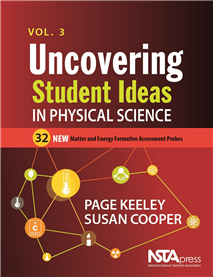All Book Chapters
Book Chapter
The purpose of this assessment probe is to elicit students’ ideas about mass. It is designed to find out if students understand the difference between mass and other properties. The probe is best used with students in grades 6–12, and can be used...
Book Chapter
Do They Have the Same Properties?
This assessment probe is to elicit students’ ideas about microscopic and macroscopic properties of matter and is designed to find out if students attribute the same properties of a substance to the particles that make up the substance. The probe is...
Book Chapter
This assessment probe is to elicit students’ ideas about characteristic properties of matter. It is designed to find out if students recognize some properties can be used to identify a substance. The probe is best used with students in grades 6–1...
Book Chapter
The purpose of this assessment probe is to elicit students’ ideas about elements and compounds. It is designed to find out how students classify a common substance, water. The probe is best used with students in grades 5–12, preferably after they...
Book Chapter
Graphite is the material in a pencil tip, and diamonds are precious jewels. They are both made of carbon. This assessment probe is to elicit students’ ideas about two seemingly different substances that are composed of the same element. It is desig...
Book Chapter
The purpose of this assessment probe is to elicit students’ ideas about neutral atoms. The probe is designed to reveal how students think about the relationship between fundamental particles inside the nucleus of an atom. It is best used with stude...
Book Chapter
The purpose of this assessment probe is to elicit students’ ideas about substances. The probe is designed to determine whether students distinguish between the everyday use of the word substance and how chemists use the word to refer to matter with...
Book Chapter
When matter changes, sometimes a new substance is formed. The purpose of this assessment probe is to elicit students’ ideas about chemical change. The probe is designed to find out how students determine whether a new substance with a different che...
Book Chapter
What Is the Result of a Chemical Change?
The purpose of this assessment probe is to elicit students’ ideas about chemical change. The probe is designed to find out whether students recognize that substances change chemically as a result of a chemical reaction. It is best used with student...
Book Chapter
What Happens to Atoms During a Chemical Reaction?
The purpose of this assessment probe is to elicit students’ ideas about chemical change. The probe is designed to find out whether students recognize that the same kinds and numbers of atoms are present before and after a chemical reaction. It is b...
Book Chapter
Observations provide evidence of a chemical change. The purpose of this assessment probe is to elicit students’ ideas about chemical change. The probe is designed to find out what changes students use as evidence of a chemical change. It is best us...
Book Chapter
The purpose of this assessment probe is to elicit students’ ideas about changes that result in new properties. The probe is designed to find out whether students recognize that some things mixed together will retain their properties and others will...
Book Chapter
This assessment probe is to elicit students’ ideas about radiation and is designed to reveal whether students distinguish between something that had been exposed to radiation (irradiated) versus something that is radioactive. It is best used with s...
Book Chapter
This assessment probe is to elicit students’ ideas about radiation and is designed to reveal how students distinguish between irradiated and radioactive material. It is best used with grades 9–12 and should be followed up with opportunities for d...
Book Chapter
Energy is difficult to define. The purpose of this assessment probe is to elicit students’ ideas about energy and is designed to reveal how students define or describe energy. This probe is best used with students in grades 4–12. When used with ...


